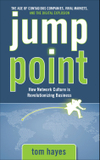Jump Point: Data-control, day-parting and success in any age


What I like about Hayes' perspective is his belief that we haven't seen the real impact of the Internet, which he predicts will come with the three-billionth user sometime in early 2011, and that the coming changes are a mixed blessing. Nevertheless, it will create an environment in which new rules and new businesses will thrive. It is an opportunity. Once that critical mass of users comes online—many solely through mobile handsets—function-based innovation, such as business that grows around a single feature, such as search, will give way to systems-based innovation that will literally wipe the slate clean.
The book progresses through much familiar and standard territory necessary for understanding the magnitude of the changes afoot in the economy today and the near future. I think it is impossible to read a business book today without walking through the concepts of network value, power laws, Dunbar numbers, and the power of personal preference. Hayes does an admirable job of reducing this mandatory lesson to its essentials.
Ultimately, Hayes predicts five major discontinuities that will shape the future economy:
* Attention economics changes the give-and-take we are familiar with in media and transactions; * Our relationship with time will change to a 24-hour-a-day awareness of the perpetual now; * Market logistics change from fixed-place retailing to person-based communication; * Cultures collide, perhaps violently; * Trust will become the definition of value.
Hayes argues that "antimarketing" will characterize the relationship between buyer and seller, that anticipating when someone will see an offer is the defining skill of the post-jump point marketer. Failure to target offers in a timely manner will be seen as offensive by many consumers. But he makes a mistake, I think, in his focus on attention, arguing that, because attention is scarce, we will trade it for services, perhaps in the form of ads played to offset the cost of telephone service (this is Chris Anderson's freeconomics idea, as well). These trades may not happen in the context of the service, i.e. you won't have to listen to an ad to make a call, but at some point during the day you will trade some attention or attention data for services.
Attention economics makes data portability an essential feature of the online environment. Events like the Data Sharing Summit, April 18 and 19th, and May 15th, in Mountain View, Calif., are aiming at facilitating the easy flow of personal data in order to make this freeconomy work right. I'm of the opinion that portability is far less important to individuals' participation in these interactions than is data control. It's only when people recognize the value of their personal information, especially in the form of what they pay attention to, and are given tools to control access to that data selectively will they be able to leverage the economic value of their personal data.
As Bruce Schneier wrote in a recent Crypto-Gram newsletter, "If I disclose information to you, your power with respect to me increases." Customers have consistently recognized and leveraged their power, it's what we do when we let Adam Smith's "invisible hand" have its way through us. Data-sharing will give way to greater data control, making the role of intermediaries who add value clear. Trust isn't the new money, but newly created value depends on who you trust.
The other most-interesting point in Hayes' book, for me, is the palpable explanation of the importance of the global time frame of economic activity he provides. I have a good friend who calls me from tomorrow about once a week. He is in Sydney, Australia, some confusingly incalculable number of hours ahead of Pacific Time. Bringing all these different local times into collision strikes me as a much greater challenge than the cultural hybridization many folks fear. When we have compete based on simultaneity, the ability to get something done now, regardless of your location, it will be a much more disorienting experience for Westerners, who have pretty much had the clock to themselves until everyone plugged into the network.
The solution, at this point, before Hayes' Jump Point event in 2011, remains difficult to identify. Yet, Hayes offers a lot of good ideas about what to do and not to do when building a business for this new world. He asserts several times that all the rules are up in the air, though I suspect that mores and habits will remain decidedly important. The more things change, the more they stay the same. It's fun to read a well-written prediction, which is what Jump Point. Worth a read, for sure.